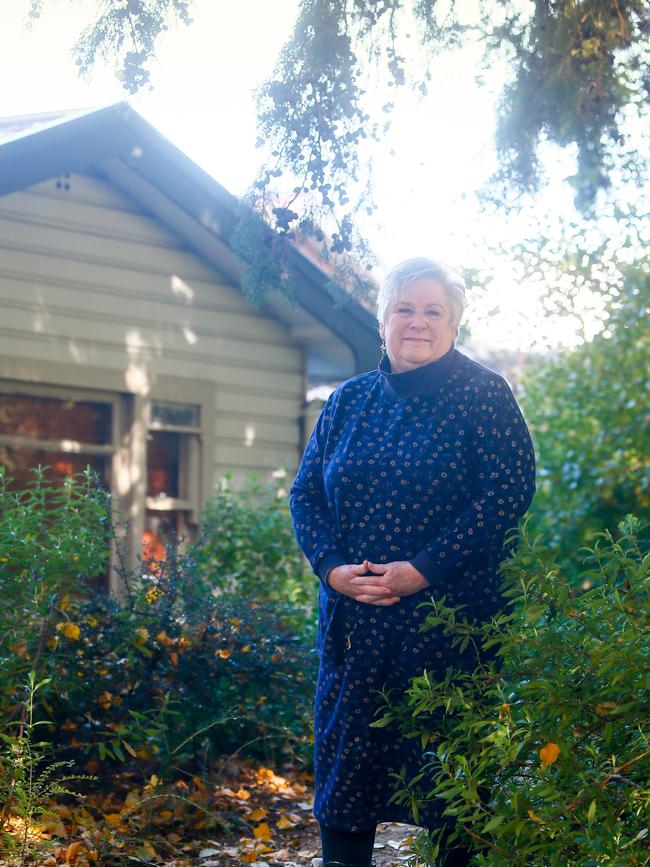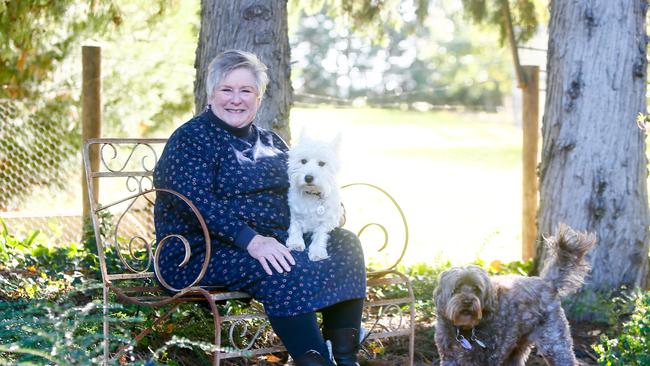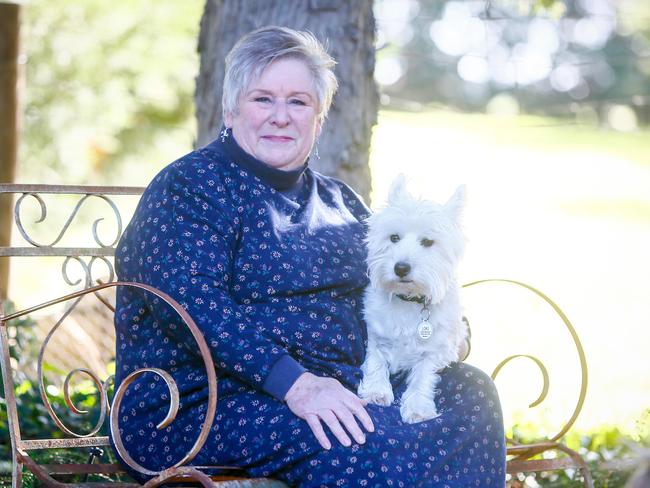‘Outrage’: RSPCA flooded with ‘abuse’ after death of dog in Sandy Bay
RSPCA Tasmania has received ‘distressing’ calls, letters and ‘abuse’ on social media following the death of a dog that was found hanging out a window in Sandy Bay last week. LATEST >>
Police & Courts
Don't miss out on the headlines from Police & Courts. Followed categories will be added to My News.
- Airfare prices slashed as demand grows for Tassie holidays
- Palmer’s anti-vaccine campaign hits Tassie mailboxes
RSPCA Tasmania has received a flood of “abuse” after the death of a German shepherd at a residence in Sandy Bay last week.
CEO Jan Davis said the death of Storm had caused outrage, but RSPCA workers and volunteers were unfairly copping backlash.
“It’s social media, it’s letters, it’s people calling us with feedback that’s quite abusive,” Ms Davis said.
“It’s been largely ill informed and on the assumption the RSPCA did nothing.
“The accusations have been distressing for my team and the inspector involved who went above and beyond.”
On Tuesday the State Government said early investigations suggested the death was an accident.

The RSPCA had visited the property on five occasions, working with the owner on improving Storm’s housing conditions, but found no evidence the dog had been mistreated.
Ms Davis said many in the community had unrealistic expectations around what the organisation was legally able to do.
“We can’t just march in and take an animal without a process, we must abide by the law.”
“Then we get complaints from people whose animals have been seized, it’s like we can’t win.”
Ms Davis also noted the restraints the organisation faced in terms of resourcing.
“We have five inspectors that cover the whole of Tasmania, that a lot of area for not a lot of people,” Ms Davis said.
“This limits our ability to undertake proactive educative work.”
On top of that she said there was already intense pressure on resources.
“We had a guy ring up the other day, he said there’s 20 roosters, a gaggle of geese, ducks and cats,”
“He said he was leaving and we’d better go and get them, and in the end we had to.
“People are in many cases, expecting us to solve problems for them.”
Ms Davis said a request has been made for an increase in funding.
“At the moment the funding we get from the government does not cover the cost of our current inspectors,” the RSPCA CEO said.
“I have to work with generous donors to pay the inspectors that are on.
“It’s a service to government, the government should cover the cost.”
Death of dog at Sandy Bay an ‘accident’ suggest investigations
A PETITION to strengthen the Animal Welfare Act after the death of a young German shepherd in Sandy Bay has been signed by more than 10,000 people.
Animal rights group Libertas started the petition and its president, Mary Coulson, said the death of Storm, the dog that was found hanging from a bedroom window last week highlighted the need for stronger laws.
“We had put in reports about that particular dog,” Ms Coulson said.
“It had food, water and shelter but it wasn’t sufficient and that dog was suffering and in pain.
“The public should also be able to report an incident and for something to be done about it.”
Ms Coulson believed the RSPCA and police often had their hands tied when it came to responding to reports of animal cruelty because of Tasmania’s animal welfare laws.
She said certain conditions which many would believe are unacceptable are legal.
“A dog can be kept on a chain for anywhere up to 23 hours a day, unless they are less than four months old,” Ms Coulson said.
“There are no specific conditions around what living conditions must consist of.
“If they have shelter over their head and a bowl of water, that’s not sufficient”
CEO of RSPCA Tasmania, Jan Davis agreed changes should be made.
“While some amendments to the Animal Welfare Act and related regulations have been made in recent years, this legislation was drafted in 1993,” Ms Davis said.

“Community attitudes to animal welfare change over time and things are very different now to what they were then.”
But Ms Davis did not believe stronger reforms would have saved Storm’s life.
“Storm had not been abused or mistreated,” Ms Davis explained.
“Our inspectors visited the property in question a number of times, initially working with the owner of the dog to ensure voluntary compliance with animal welfare regulations with respect to improving the conditions in which Storm had been housed.”
Ms Davis said the owner was convicted of an animal cruelty offence after an infringement notice was issued in March.
“However, the legislation only permits our inspectors to seize a dog under certain very limited circumstances and, in this instance, there were no grounds that would meet the required burden of proof to remove the dog from this environment,” Ms Davis said.
“So we have done everything we are legally able to and, obviously, the RSPCA must operate within the law, no matter what we think.”

Primary Industries Minister Guy Barnett said initial investigations suggested Storm’s death was an accident, however investigations were ongoing.
Tasmanian animal cruelty laws slammed as ‘inadequate’
THERE are growing calls for an overhaul of “out of date” and “inadequate” animal cruelty laws following the shocking death of a dog at a Sandy Bay home this week.
A German shepherd was found dead hanging from a bedroom window at the property on Tuesday, with revelations RSPCA inspectors had attended several times in recent months to investigate complaints of mistreatment.
It was also revealed the dog’s owner had previously been prosecuted for animal cruelty and convicted, but it is not known how the dog died.
The organisation said inspectors were devastated by the dog’s death, with chief executive Jan Davis saying the legislation only permitted them to seize a dog in limited circumstances.
Brightside Farm Sanctuary founder Emma Haswell also said the laws needed to be strengthened.
“The laws are so feeble around this whole area ... an animal has to be nearly dead for the RSPCA to seize it,’’ she said.
“I see it all the time, almost weekly, with all sorts of different animals.
“Chickens, dogs, horses, the lot — it’s a really bad situation where the laws aren’t comprehensive enough to get action for animals before it’s too late.”

The RSPCA usually prosecute cases of animal cruelty but Ms Haswell believed a dedicated police animal welfare unit should be established.
Greens leader Cassy O’Connor argued the Animal Welfare Act introduced in 1993 was not strong enough to protect animals from neglect and cruelty.
“It’s clear the legislation needs strengthening to allow animal welfare officers to intervene in a broader range of circumstances,’’ Ms O’Connor said.
“Animals shouldn’t be suffering cruelty because laws are out of date and inadequate.
“As they stand, Tasmanian animal welfare laws are out of step with community expectations. They’re also failing animals.”

Ms O’Connor also called for animal welfare inspectors to be better resourced, and said the Greens had moved to amend the laws to allow for “mental suffering” as a category of harm, but said it was voted down by the major parties.
A spokesman for the Department of Primary Industries, Parks, Water and Environment said the agency took animal welfare seriously.
“The Animal Welfare Act 1993 is a robust piece of legislation which was significantly strengthened by the Government,’’ the spokesman said.
“The penalty for aggravated cruelty to up to $33,600 and/or a maximum custodial sentence of up to five years imprisonment for an individual under the Animal Welfare Act 1993, and strengthened penalties across the board to send a strong message and increase deterrence against acts of animal cruelty.
“Biosecurity Tasmania animal welfare officers have the same regulatory powers and operate under the same compliance and enforcement framework as the RSPCA.
“The government recently committed to increasing the number of animal welfare officers working within Biosecurity Tasmania by three across the state.
“Biosecurity Tasmania and the RSPCA are working together to investigate this particular case.”
EARLIER:
THE death of a dog at Sandy Bay this week has prompted calls for stronger animal welfare laws, with revelations RSPCA inspectors had attended the property in question several times in recent months to investigate complaints of mistreatment.
RSPCA Tasmania chief executive Jan Davis said its inspectors have been left devastated by the news, after the dog, a german shepherd, was found dead on Tuesday.
Tasmania Police said it was aware of the incident and attended the scene, but said the RSPCA was the lead agency for cases of animal cruelty.
The cause of the dog’s death is not known.

Ms Davis confirmed inspectors had attended the property on multiple occasions, culminating in an infringement notice being issued in March to the dog’s owner, and as a result the dog’s owner had been convicted of an animal cruelty offence.
Our laws are not strong enough to enable us to successfully prosecute owners who don’t do the right thing by their animals – RSPCA CEO Jan Davis
“Our inspectors have returned to the property on a number of occasions since March in an attempt to ensure the dog’s safety,” she said.
“However, the legislation only permits our inspectors to seize a dog under certain, very limited circumstances.
“Unfortunately, we have been unable to meet the required burden of proof to remove the dog from this environment.”
A nearby resident said she had held fears for the dog for several months, and even approached the dog’s owner herself and politely offered to help, which she said the owner declined.
The resident said her partner had seen the dog hung out of a bedroom window on Tuesday afternoon and saw that it was no longer alive, and called the RSPCA.
“He’s very traumatised,” she said.
Ms Davis said many had blamed the RSPCA for what they said was a failure to adequately protect the dog.
“Many people are saying that the RSPCA has done nothing to protect this dog. That is far from the truth,” she said.
“Like everyone else, everyone at the RSPCA is devastated by what has happened.
“Our inspectors deal every day with things most of us can’t even begin to comprehend.
“They are distressed that, although they have done everything they are legally able to in this case, it was still not enough.
“Obviously, the RSPCA must operate within the law – no matter what we think.
“The real issue here is that our laws are not strong enough to enable us to successfully prosecute owners who don’t do the right thing by their animals.
“No reasonable person believes this is acceptable – and these laws need to change.”


